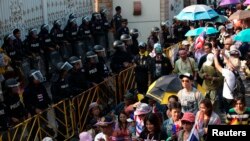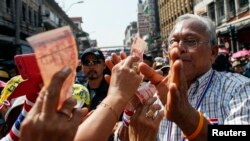BANGKOK —
Thailand Army Chief General Prayuth Chan-ocah called Friday for restraint from both sides, and did not explicitly rule out the possibility of a military coup.
"The door to a coup is neither open nor closed," he said, adding that "anything can happen."
Prayuth reiterated a request that people stop asking the army to take sides in the bitter dispute and show restraint ahead of early elections set for February 2.
Thai Deputy Prime Minister Surapong Tovichakchaikul said Friday he will ask the military for help securing candidate registrations that begin Saturday. The comments were made a day after clashes between police and anti-government protesters in Bangkok left one police officer dead and dozens injured.
In a televised address Thursday, the country's caretaker deputy prime minister, Pongthep Thepkanjana rejected a request from the election commission to postpone a February vote and said the general election would go ahead as planned.
Prime Minister Yingluck Shinawatra called for the early vote as a way to end the political crisis. Protesters want the prime minister's removal, saying it is necessary to purge the country of corruption and money politics.
Opposition leader, Abhisit Vejjajiva, whose Democrat Party is boycotting the February poll, says the military has called for a political resolution to the conflict.
"The military has tried to keep its role to a minimum," Vejjajiva said. "They have expressed clearly that political problems are to be sorted out through political organizations, not the military."
Bangkok has faced weeks of anti-government protests led by ex-Deputy Prime Minister Suthep Thaugsuban, who is calling for Prime Minister Yingluck Shinawatra's resignation. The latest rallies have drawn tens of thousands, triggered by government legislation that calls for blanket amnesty that is seen as favoring her exiled older brother, former Prime Minister Thaksin Shinawatra, a key figure behind the governing Pheu Thai Party who has stayed abroad to avoid a two-year jail term for corruption.
The opposition, which views Yingluck as a puppet of her brother, accuses the sitting prime minister of parliamentary abuses and is demanding political reforms before fresh elections are held.
But Yingluck says her government will press on with the vote and has put forward a plan for political reform to be set in place after the election. On Wednesday, she proposed the creation of an independent national reform council that would work alongside the new government, but protesters immediately rejected the proposal, saying reforms should be undertaken before any vote.
The main opposition Democrat Party has said it will boycott the election, which the prime minister's Pheu Thai Party is predicted to win.
As parties and candidates began registering for the vote earlier this week, protests escalated.
According to Chris Baker, a Bangkok-based expert on Thai politics, the anti-government movement risks alienating its support base.
"What seems to be happening is that as the Suthep mob [has] become more violent and more destructive and more extreme," he said. "They are losing quite a lot of middle ground support. I suspect the policy of the government is to have some patience for a little bit longer because there are signs that his movement is self-destructing."
Yingluck and her brother have the support of Thailand's rural poor, largely because of Thaksin's policies to bring virtually free health care, cheap loans and other benefits to the long-neglected countryside.
But those same policies are disliked by an urban middle class and more educated elite.
Sunai Phasuk, a senior researcher with the U.S.-based Human Rights Watch, says he fears that the largely rural government supporters may launch counter-rallies against Suthep's movement.
"Thailand is entering a period of brinkmanship — one of the worst in modern history, [wherein] Suthep and his supporters claim to be the great masses, but they are only a fraction of the entire population," he said. "We don't know the people who voted for Thaksin's side last time — how they would react to Suthep's side, how long they can be patient from reacting to Suthep's side. That is worrying."
In a bid to avoid further violence, the election commissions announced relocated registration venues on Friday. But commissioners say they will decide by January 2 whether they will resign over fears of violence in the lead-up to the poll.
Media reports Friday quote senior government members indicating there is support for military intervention to prevent the fall of the government.
Former Prime Minister Thaksin, a billionaire businessman, was ousted in a 2006 military coup.





